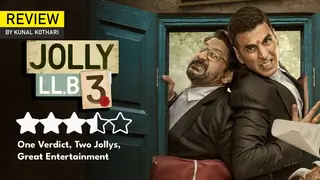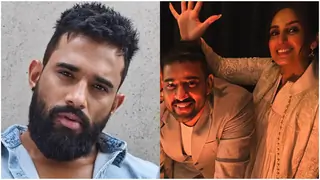Single Salma Review: Huma Qureshi shines in this saga that becomes a lecture on self-worth
Huma Qureshi shines in a relatable yet uneven story that starts breezy but turns loud and preachy. Despite charming moments, the film loses its balance midair
Published: Friday,Oct 31, 2025 04:41 AM GMT+05:30

It was just a few days ago that half the internet was divided over who Belly would end up with, Jeremiah or Conrad in The Summer I Turned Pretty. And now here comes Single Salma, bringing us another triangle that somehow makes us equally invested and equally frustrated. Don’t worry, I am not comparing Lucknow to Cousins Beach (no one could), but both have one thing in common: a female caught between two very different men and a world that can’t stop judging her for her choices.
Except here, the stakes are not just about summer love, they’re about lifelong expectations. Salma (Huma Qureshi), a 33-year-old from Lucknow, has spent most of her life supporting her family, only to be defined by that one status everyone loves to whisper about, single. She’s hardworking, independent, and weary of being everyone’s saviour except her own.
Meet Salma, the Single “Problem” from Lucknow

There are two kinds of single women in Hindi cinema: the tragic kind who are “waiting” to be rescued and the fiery kind who make you want to stand up and clap. Single Salma tries to put its heroine somewhere between the two, only to lose her halfway through a monologue about self-love.
Directed by Nachiket Samant and written by Mudassar Aziz, Amina Khan, and Ravi Kumar, the film follows Salma's journey. Her relatives see her as the family’s breadwinner, her neighbours see her as the family’s shame, and society at large just wants her married.
So when Salma finally agrees to consider an arranged match with Sikandar (Shreyas Talpade), it seems like the classic desi love story is about to unfold. But the plot flips when work sends her to London — and so begins a love triangle with Meet (Sunny Singh), her charming but modern colleague who speaks of open relationships, acceptance, and other things Lucknow aunties would faint hearing about.
The Setup: Light, Funny, Relatable — and Full of Promise

The film opens with a breezy tone. The humour lands, the banter feels lived-in, and Salma’s world, small-town, slightly chaotic, full of nosy relatives, is instantly believable. There’s an endearing energy in the way the film paints her life: the girl who holds everything together, pays everyone’s bills, yet is told she’s incomplete because she hasn’t found a man.
For a while, Single Salma seems to be heading somewhere refreshing. Huma Qureshi owns the frame; she brings warmth, humor, and an undercurrent of sadness to Salma’s frustration. You root for her. You see your friend, your cousin, maybe even yourself in her.
But just when you think the film might dig deeper into the nuances of being single in India, bam! It decides to pack Salma off to London. And that’s when the chaos begins.
London Calling: When the Film Forgets Its Own Address

The London chapter starts with promise, the tone shifts, the setting opens up, and Meet enters the picture. Sunny Singh brings easy charm and a touch of confusion (and an occasionally confused accent). His chemistry with Huma is soft, not sizzling, but it works for the story.
Then come the viral pictures. The monokini. The scandal. The Lucknow outrage. Suddenly, we’re back in moral policing territory. The problem isn’t the topic; it’s how loudly the film decides to talk about it. What begins as a slice-of-life comedy about societal pressure turns into a sermon with a microphone.
There’s a sequence where Sikandar, mustache redder than beetroot, accent disappearing faster than logic, defends Salma by referencing Princess Diana. Yes, that Diana. It’s meant to be emotional, but it lands somewhere between absurd and unintentionally hilarious.
The film’s second half forgets the fine art of saying something quietly. Instead, it shouts every message twice, once through dialogue and again through background music that all but screams, “You go, girl!”
The Preachy Pitfall: When Self-Love Turns into a Lecture

By the time Salma returns home, having cheated on her fiancé and “found herself,” the film is ready for its climax monologue, the “I don’t need a man, I just need me” speech. And while Huma delivers it with passion, you can’t help feeling the writing doesn’t trust the audience enough. It wants to spell out every theme in capital letters.
Yes, Indian women face endless marriage pressure. Yes, being single past 30 still raises eyebrows. But instead of letting Salma’s choices speak for themselves, the film keeps hammering its point till you stop listening. What started as a relatable comedy about a single woman ends up being a confused lecture on modern love, complete with hashtags like #SelfLove and #BeYourOwnQueen practically floating in the air. If only the makers had believed that subtlety can be powerful too.
Performances: The Good, the Meh, and the Moustache

Let’s start with the good. Huma Qureshi is the beating heart of this film. She plays Salma with a mix of humour and heartbreak that feels real. Her vulnerability shines in quiet moments, a glance at her reflection before meeting a suitor, a forced smile when someone says “time is running out.” She elevates the material every chance she gets.
Sunny Singh as Meet brings an understated warmth. He’s the progressive, slightly confused guy with ideas bigger than his emotional maturity, and that’s part of his charm. He isn’t reinventing the wheel, but he does what’s required.
Shreyas Talpade, however, feels misplaced. His exaggerated Lucknowi look, red mustache, and all make it hard to take him seriously. His accent wobbles, his character swings between overdramatic and cartoonish, and his sincerity gets buried somewhere under all that styling.
Kanwaljit Singh as Nawab Sahab and Navni Parihar as Mrs. Shrivastav are fine but underused. Navni, in particular, gets one inspiring speech that makes you wish the film had given her more to do. The supporting cast, especially Salma’s colleagues, brings much-needed spark and comic relief as their scenes feel fresh, funny, and spontaneous.
The Hits and Misses

One of the more grounded parts of Single Salma is the way it captures Salma’s slow, awkward transition from her small-town Indian life to a freer, more Western world. There’s something genuinely relatable about watching her learn things we take for granted, like not knowing what it means when a man sends a bottle of champagne to her table as a way of asking her out, or nervously sipping alcohol for the first time, unsure if she’s doing it right. Those little moments of discovery feel warm and human, like watching someone unfold layer by layer.
But as authentic as that journey feels, the film loses emotional depth elsewhere, especially in the way it handles her relationship with Sikandar. Once she leaves for London, he simply disappears from her life; not a single phone call or message to bridge that distance. It leaves the connection feeling incomplete, more like a plot device than a relationship. The unnecessary bits like the British grandmother and her “travel the world, find yourself” speech could’ve easily been skipped. Yet, the tenderness between Salma, her brother, and her best friend feels real and lived-in, grounding the story every time it starts to drift.
The Verdict
At its core, Single Salma is about something important: the loneliness, judgment, and quiet resilience of being an unmarried woman in a society obsessed with “settling down.” It could have been a sharp, funny, and emotional story about female independence without being loud about it.
But the film can’t resist overexplaining itself. It starts as a comedy of manners and ends as a motivational seminar. The intention is admirable, the message is timely, but the storytelling loses its footing somewhere between Lucknow and London.
Huma Qureshi tries her best to hold it all together, and for that alone, Single Salma isn’t a total miss. But for a film that begins with wit and promise, it ends up tripping over its own preachiness. Maybe Salma didn’t need a man, but this film definitely needed better editing.
Single Salma follows a 33-year-old Lucknow woman caught between love, duty, and self-discovery. Huma Qureshi shines in a relatable yet uneven story that starts breezy and funny but turns loud and preachy. Despite charming moments and heartfelt performances, the film loses its balance midair. With better editing and subtlety, this slice-of-life comedy could’ve truly sparkled
Join Our WhatsApp Channel
Stay updated with the latest news, gossip, and hot discussions. Be a part of our WhatsApp family now!
Join NowYour reaction
 Nice
Nice Great
Great Loved
Loved LOL
LOL OMG
OMG Cry
Cry Fail
Fail




















Post a comment